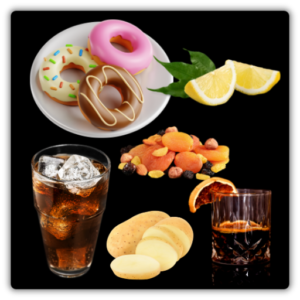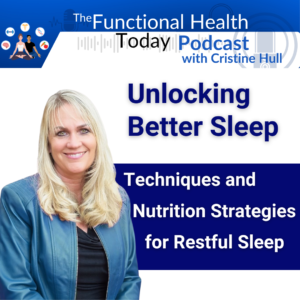Dental Health: What Foods Should You Avoid for Healthy Teeth?
 Maintaining strong, healthy teeth requires more than just regular brushing and flossing—it’s also about making smart dietary choices. While some foods can strengthen your enamel and promote oral health, others can weaken your teeth and increase the risk of decay. Here are the top offenders to avoid:
Maintaining strong, healthy teeth requires more than just regular brushing and flossing—it’s also about making smart dietary choices. While some foods can strengthen your enamel and promote oral health, others can weaken your teeth and increase the risk of decay. Here are the top offenders to avoid:
- Sugary Treats
- Candies, cookies, and sodas are high in sugar, which feeds harmful bacteria in your mouth. These bacteria produce acid that erodes tooth enamel, leading to cavities. Sticky candies like caramels are particularly harmful as they cling to teeth and prolong exposure.
- Candies, cookies, and sodas are high in sugar, which feeds harmful bacteria in your mouth. These bacteria produce acid that erodes tooth enamel, leading to cavities. Sticky candies like caramels are particularly harmful as they cling to teeth and prolong exposure.
- Acidic Foods and Beverages
- Citrus fruits, tomatoes, and vinegar-based dressings can wear down enamel due to their high acidity. While these foods are nutritious, consume them in moderation and rinse with water afterward to protect your teeth.
- Citrus fruits, tomatoes, and vinegar-based dressings can wear down enamel due to their high acidity. While these foods are nutritious, consume them in moderation and rinse with water afterward to protect your teeth.
- Starchy Foods
- Chips, bread, and pasta may not seem harmful, but they break down into sugars and can get trapped between your teeth and gums. This creates an environment for bacteria to thrive.
- Chips, bread, and pasta may not seem harmful, but they break down into sugars and can get trapped between your teeth and gums. This creates an environment for bacteria to thrive.
- Carbonated Drinks
- Sodas and sparkling drinks have phosphoric and citric acids, which wear away tooth enamel. Dark-colored sodas also stain teeth, compounding the damage.
- Sodas and sparkling drinks have phosphoric and citric acids, which wear away tooth enamel. Dark-colored sodas also stain teeth, compounding the damage.
- Dried Fruits
- Although marketed as healthy, dried fruits like raisins are high in sugar and stick to teeth, creating a perfect breeding ground for bacteria.
- Although marketed as healthy, dried fruits like raisins are high in sugar and stick to teeth, creating a perfect breeding ground for bacteria.
- Alcohol
- Alcohol can dry out your mouth, reducing saliva production. Saliva is essential for washing away food particles and neutralizing acids.
KEY POINTS
Sugary and acidic foods, such as candies, soda, and citrus fruits, can erode tooth enamel and promote decay, making it important to limit their intake for better oral health.
Consuming foods rich in calcium, phosphorus, and vitamin D, such as dairy, leafy greens, and fatty fish, can help remineralize and strengthen tooth enamel.
Healthy snack alternatives, like fresh vegetables, cheese, and nuts, not only protect teeth but also help clean them, reducing the risk of plaque buildup and decay.
Staying hydrated, practicing good oral hygiene, and chewing sugar-free gum can support enamel remineralization, while professional treatments like fluoride varnishes can further protect teeth.

Pop in your email below, and we’ll zip it straight to your inbox so you never lose it!
What Foods Help Strengthen Your Teeth?
Tips for Better Oral Health:
- Opt for Whole Foods: Fresh fruits, vegetables, and dairy products can help strengthen teeth and stimulate saliva production.
- Stay Hydrated: Drink plenty of water to rinse your mouth and maintain saliva levels.
- Chew Sugar-Free Gum: It helps clean teeth and stimulates saliva flow.
By making mindful dietary choices, you can protect your teeth and gums, and maintain a bright, healthy smile. For additional tips on reducing the risk of tooth decay from the foods you eat, visit this guide from the ADA.
How Can Fruits and Vegetables Keep Your Teeth Healthy?
Eating fruits and vegetables can help prevent plaque buildup and damage your teeth. Their natural enzymes attacking your teeth are effective against soft drinks and sugary foods that stick to your teeth and cause tooth decay. The American Dental Association recommends incorporating these foods into your diet.
Fruits and vegetables also provide essential minerals to areas of teeth that have lost strength, helping to put back minerals your teeth might need. After you eat sugary foods, it’s important to brush your teeth and floss your teeth to remove any remaining residue and protect the surfaces of all your teeth.
What Role Does Saliva Play in Dental Health?
Saliva plays a crucial role in maintaining dental health by helping to neutralize acids that attack your teeth. When you drink and eat starchy or sugary foods, these acids can attack your teeth and leads to tooth decay. However, your mouth makes more saliva after you finish eating, which can reduce the effects of these harmful substances.
Additionally, saliva can wash away food particles, making chocolate washes off the teeth easier. It also contains minerals from foods with fluoride that helps your teeth remineralize. Without adequate saliva, your teeth might have lost due to the constant presence of acids that attack, particularly from commercially prepared foods high in lot of sugar.
To promote better dental health, focus on foods to seek that stimulate saliva production and include healthy options that naturally stain your teeth less. Avoiding bad for your teeth items can also protect the surface of teeth and prevent conditions that could damage your teeth in the long run.
Which Snacks Should You Avoid for Healthy Teeth?
Snacking can be a hidden culprit in dental health issues, especially when it involves foods that promote tooth decay or enamel erosion. Here are some common snacks to avoid if you want to keep your teeth healthy:
- Sticky Sweets
- Candies like taffy, gummy bears, or caramel cling to teeth and are difficult to remove. Their high sugar content provides a feast for cavity-causing bacteria.
- Candies like taffy, gummy bears, or caramel cling to teeth and are difficult to remove. Their high sugar content provides a feast for cavity-causing bacteria.
- Potato Chips
- Though they may seem harmless, chips are high in starch, which breaks down into sugars. The sticky residue left behind can settle between teeth and fuel plaque formation.
- Though they may seem harmless, chips are high in starch, which breaks down into sugars. The sticky residue left behind can settle between teeth and fuel plaque formation.
- Dried Fruits
- Raisins, apricots, and other dried fruits are dense in sugar and stick to teeth, increasing the risk of decay. Opt for fresh fruit instead, which has natural sugars but is less likely to linger on teeth.
- Raisins, apricots, and other dried fruits are dense in sugar and stick to teeth, increasing the risk of decay. Opt for fresh fruit instead, which has natural sugars but is less likely to linger on teeth.
- Sugary Granola Bars
- Many granola bars, marketed as “healthy,” are loaded with sugar and can adhere to teeth. If you enjoy these snacks, look for low-sugar alternatives and rinse your mouth with water afterward.
- Many granola bars, marketed as “healthy,” are loaded with sugar and can adhere to teeth. If you enjoy these snacks, look for low-sugar alternatives and rinse your mouth with water afterward.
- Popcorn
- While popcorn itself isn’t sugary, unpopped kernels and hulls can get stuck between teeth and are tough to remove. Flavored varieties, like caramel popcorn, add a sugary element to the risk.
- While popcorn itself isn’t sugary, unpopped kernels and hulls can get stuck between teeth and are tough to remove. Flavored varieties, like caramel popcorn, add a sugary element to the risk.
- Soda and Energy Drinks
- Sipping on sugary or acidic drinks between meals bathes your teeth in harmful substances, promoting decay and weakening enamel.
Healthier Snack Alternatives:
- Fresh Vegetables: Crunchy snacks like carrots and celery are not only low in sugar but also help clean your teeth.
- Cheese and Yogurt: These are rich in calcium and can strengthen enamel.
- Nuts: Low in sugar and a good source of healthy fats, nuts are a tooth-friendly option.
- Fresh Fruit: Apples and pears can satisfy a sweet craving while helping to clean teeth.
Snacking wisely can make a big difference in your dental health. Choose snacks that nourish your body and protect your teeth!
How Can You Rebuild Tooth Enamel?
Tooth enamel is the hard outer layer that protects your teeth, but it can wear down due to acid erosion, poor dietary habits, and inadequate oral care. While enamel cannot regenerate once lost, you can strengthen and remineralize it to protect your teeth and prevent further damage. Here’s how:
1. Eat Enamel-Strengthening Foods
Certain nutrients play a critical role in rebuilding and protecting enamel:
- Calcium and Phosphorus: Found in dairy products, leafy greens, almonds, and fish, these minerals can help remineralize enamel.
- Vitamin D: Necessary for calcium absorption, this vitamin is abundant in fatty fish, egg yolks, and fortified foods.
- Fluoride: Fluoride strengthens enamel and reduces decay. Use fluoride toothpaste or drink fluoridated water to protect your teeth.
2. Avoid Acidic and Sugary Foods
Acidic foods (like citrus, soda, and vinegar) and sugary snacks erode enamel over time. Limit their intake and rinse your mouth with water after consuming them.
3. Stay Hydrated
Drinking plenty of water, especially fluoridated water, helps wash away food particles and neutralize acids in your mouth.
4. Practice Excellent Oral Hygiene
- Brush twice daily with a fluoride toothpaste to help remineralize weak spots.
- Floss regularly to remove food and plaque between teeth.
- Use a fluoride mouthwash to reinforce enamel and combat decay.
5. Chew Sugar-Free Gum
Chewing gum stimulates saliva production, which naturally remineralizes teeth by washing away acids and supplying essential minerals.
6. Seek Professional Treatments
Dentists can apply fluoride varnishes or recommend prescription toothpaste for stronger enamel. In some cases, they may suggest dental bonding or sealants to protect weakened areas.
7. Limit Snacking and Sipping
Frequent eating or sipping acidic beverages keeps your teeth bathed in harmful substances. Stick to designated meal times and drink water instead of sugary drinks.
By making these lifestyle changes, you can rebuild and protect your enamel, ensuring a healthier, brighter smile. Consistency is key—combine these practices with regular dental check-ups for the best results.
To protect your oral health, follow a daily routine of brushing, flossing, and eating a healthy diet while limiting sugary foods and drinks. For more tips on maintaining good oral health, visit this Mayo Clinic guide.










